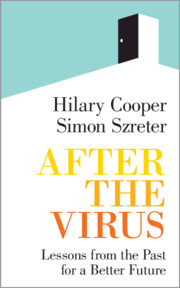Book contents
- After The Virus
- After the Virus
- Copyright page
- Dedication
- Contents
- Figures and Images
- Preface
- Introduction
- Part I COVID-19 Was Always a Matter of ‘When’ Not ‘If’
- Part II Why COVID-19 Was a Perfect Storm
- Part III HOW COVID-19 CHALLENGES US TO CHANGE
- Part IV After the Virus: Who Do We Want to Be?
- 10 Casting Aside the Neoliberal State
- 11 The Birth of a Collectivist Individualism
- 12 A NURTURING AND EMPOWERING STATE
- 13 Seven Pillars of Empowerment
- 14 Greater Even Than a Pandemic
- Acknowledgements
- Notes
- References
- Index
14 - Greater Even Than a Pandemic
from Part IV - After the Virus: Who Do We Want to Be?
Published online by Cambridge University Press: 20 August 2021
- After The Virus
- After the Virus
- Copyright page
- Dedication
- Contents
- Figures and Images
- Preface
- Introduction
- Part I COVID-19 Was Always a Matter of ‘When’ Not ‘If’
- Part II Why COVID-19 Was a Perfect Storm
- Part III HOW COVID-19 CHALLENGES US TO CHANGE
- Part IV After the Virus: Who Do We Want to Be?
- 10 Casting Aside the Neoliberal State
- 11 The Birth of a Collectivist Individualism
- 12 A NURTURING AND EMPOWERING STATE
- 13 Seven Pillars of Empowerment
- 14 Greater Even Than a Pandemic
- Acknowledgements
- Notes
- References
- Index
Summary
This final chapter argues that there is a far greater crisis heading our way. What is far worse than nature ‘biting back’ with a deadly virus is that we now live with the disturbing knowledge that the natural world that sustains us all is liable to collapse. COVID-19 is not a ‘once in a hundred years’ event that we can soon confine to folklore. It is a warning shot across our bows, alerting us to the seriousness of the imminent challenges of climate change and the escalating crises of nature and social inequality. These cannot be addressed unless we discard the neoliberal straightjacket and revitalise a nurturing society.
It is often considered that the industrial revolution was Britain’s most unique contribution to world history. However, that achievement emerged from a society and economy that had enjoyed unprecedented success due to its adoption since c.1600 of the policies, principles and practices of collectivist individualism, a more valuable British legacy to the world than the unbalanced individualism adopted in the subsequent industrial revolution. It is a legacy that urgently needs to be rediscovered to enable us all to find the commitment to each other needed to meet our imminent challenges. Coexistence, anti-exploitation and nurturing are the moral codes of the collectivist-individualist ethics, a morality of giving, not taking.
Keywords
- Type
- Chapter
- Information
- After the VirusLessons from the Past for a Better Future, pp. 341 - 346Publisher: Cambridge University PressPrint publication year: 2021

